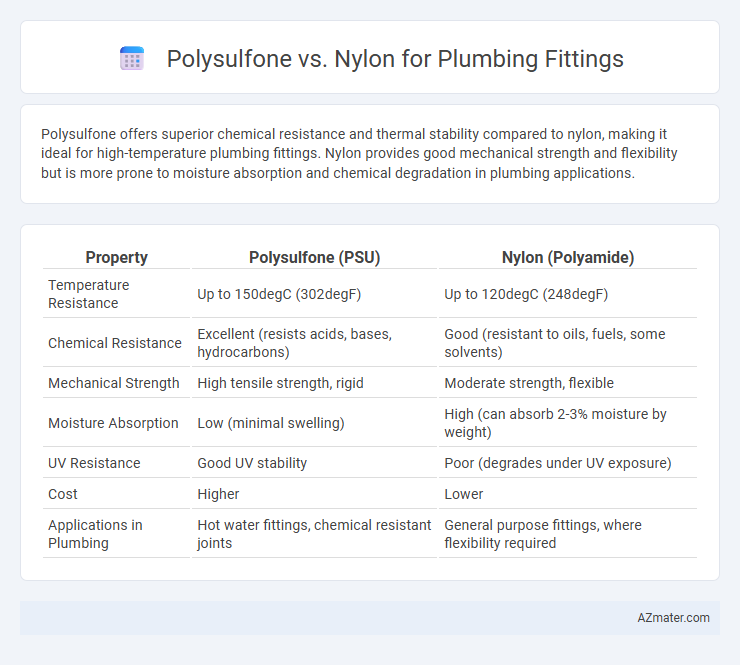Polysulfone offers superior chemical resistance and thermal stability compared to nylon, making it ideal for high-temperature plumbing fittings. Nylon provides good mechanical strength and flexibility but is more prone to moisture absorption and chemical degradation in plumbing applications.
Table of Comparison
| Property | Polysulfone (PSU) | Nylon (Polyamide) |
|---|---|---|
| Temperature Resistance | Up to 150degC (302degF) | Up to 120degC (248degF) |
| Chemical Resistance | Excellent (resists acids, bases, hydrocarbons) | Good (resistant to oils, fuels, some solvents) |
| Mechanical Strength | High tensile strength, rigid | Moderate strength, flexible |
| Moisture Absorption | Low (minimal swelling) | High (can absorb 2-3% moisture by weight) |
| UV Resistance | Good UV stability | Poor (degrades under UV exposure) |
| Cost | Higher | Lower |
| Applications in Plumbing | Hot water fittings, chemical resistant joints | General purpose fittings, where flexibility required |
Introduction to Polysulfone and Nylon
Polysulfone is a high-performance thermoplastic known for its exceptional thermal stability, chemical resistance, and mechanical strength, making it ideal for demanding plumbing applications. Nylon, a versatile synthetic polymer, offers excellent abrasion resistance, flexibility, and impact strength, commonly used in plumbing fittings requiring durability and low friction. Both materials provide distinct advantages in plumbing systems, with polysulfone excelling in high-temperature and chemically aggressive environments, while nylon is favored for general-purpose fittings and ease of processing.
Chemical Composition and Structure
Polysulfone's aromatic repeating units and sulfone groups impart superior thermal stability and chemical resistance compared to nylon, which is composed of polyamide chains susceptible to hydrolysis. The rigid, glassy structure of polysulfone results in excellent dimensional stability and resistance to harsh chemicals, making it ideal for aggressive plumbing applications. Nylon's semi-crystalline polyamide structure provides flexibility and toughness but tends to absorb moisture, potentially compromising performance in chemically demanding environments.
Mechanical Strength Comparison
Polysulfone offers superior mechanical strength compared to nylon, with higher tensile strength and better resistance to impact and creep under continuous stress. Nylon exhibits good flexibility but tends to absorb moisture, which can reduce its mechanical performance in wet plumbing environments. Polysulfone's enhanced durability and thermal stability make it a preferred material for plumbing fittings requiring long-term reliability under mechanical loads.
Temperature Resistance and Stability
Polysulfone exhibits superior temperature resistance and stability for plumbing fittings, maintaining structural integrity up to approximately 160degC, compared to Nylon, which typically withstands temperatures up to 120degC. The high thermal stability of Polysulfone ensures consistent performance in hot water systems, reducing the risk of deformation and failure under prolonged heat exposure. Nylon's susceptibility to hydrolysis at elevated temperatures limits its application in high-temperature plumbing environments, making Polysulfone the preferred material for enhanced durability and reliability.
Chemical Resistance in Plumbing Applications
Polysulfone exhibits superior chemical resistance compared to nylon, making it more suitable for plumbing fittings exposed to harsh chemicals and high-temperature fluids. Nylon tends to absorb moisture and can degrade when in prolonged contact with acids, alkalis, and certain solvents, whereas polysulfone maintains its structural integrity and resists hydrolysis effectively. In plumbing applications involving aggressive chemical environments, polysulfone fittings provide enhanced durability and longer service life.
Durability and Lifespan
Polysulfone plumbing fittings exhibit superior durability and a longer lifespan compared to nylon due to their higher resistance to heat, chemical corrosion, and mechanical stress. Polysulfone maintains structural integrity in temperatures up to 180degC, while nylon typically degrades faster under similar conditions and shows susceptibility to hydrolysis over time. These properties make polysulfone fittings ideal for high-pressure and high-temperature plumbing applications requiring extended service life.
Ease of Fabrication and Installation
Polysulfone offers superior ease of fabrication and installation in plumbing fittings due to its excellent thermal stability and resistance to chemical degradation, allowing precise machining and reliable solvent welding. Nylon, while flexible and abrasion-resistant, may require additional treatments to improve dimensional stability and can be more challenging to join securely because of its hygroscopic nature. The better dimensional consistency and solvent compatibility of polysulfone reduce installation errors and improve long-term system integrity.
Cost and Availability
Polysulfone plumbing fittings typically cost more than nylon counterparts due to their higher temperature resistance and chemical durability. Nylon fittings are widely available and often preferred for budget-conscious plumbing projects because of their lower price and easier sourcing. Availability of polysulfone may be limited in some markets, impacting overall project lead time and expense.
Typical Use Cases in Plumbing Fittings
Polysulfone is commonly used in plumbing fittings for applications requiring high temperature resistance, chemical stability, and durability, such as hot water systems and industrial fluid handling. Nylon fittings excel in environments needing flexibility, impact resistance, and wear resistance, making them ideal for cold water supply lines, irrigation systems, and lightweight connectors. Both materials are chosen based on specific plumbing needs, with polysulfone favored for demanding thermal conditions and nylon preferred for cost-effective, versatile applications.
Summary: Choosing Between Polysulfone and Nylon
Polysulfone offers superior heat resistance and chemical stability, making it ideal for high-temperature and corrosive plumbing environments, while nylon provides excellent toughness and abrasion resistance suited for general plumbing applications. Polysulfone's higher mechanical strength and dimensional stability ensure long-term performance under stress, whereas nylon is more cost-effective and easier to mold. Selecting between polysulfone and nylon depends on the specific plumbing requirements, balancing factors such as temperature tolerance, chemical exposure, mechanical demands, and budget constraints.

Infographic: Polysulfone vs Nylon for Plumbing Fitting
 azmater.com
azmater.com